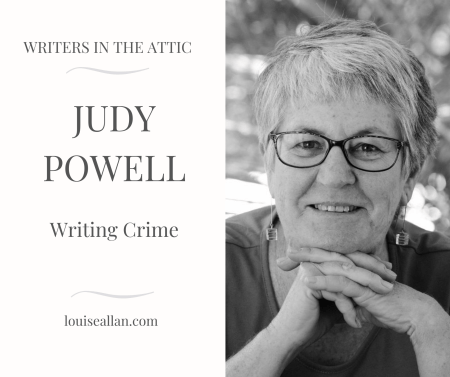I don’t believe I’ve had an archaeologist visit the attic before, so please welcome Judy Powell to tell us about her historical crime novel, The Brisbane Line.

Judy is a historian and archaeologist who has a passion for bringing the past to life. She’s worked as a high school teacher, an academic, a National Parks officer, a museum administrator and has excavated in Jordan, Cyprus and Greece as well as leading historical archaeology projects in Australia.
Judy’s previous writing includes school textbooks, academic publications, government reports and a biography of the first person to teach archaeology in Australia (Love’s Obsession. The lives and archaeology of Jim and Eve Stewart. Wakefield Press. 2013). In 2017 she was awarded a QANZAC Fellowship by the State Library of Queensland to pursue research into, and writing of, a series of crime novels set in Brisbane during World War II.
You can read more about Judy on her website and buy her book, The Brisbane Line, by clicking the link.

~
Writing Crime
I’m lucky. This is the second book I’ve written where the material has literally fallen into my lap.
In the case of The Brisbane Line, a historical crime novel, it doesn’t matter how this happened. Suffice to say that I discovered a bunch of folders kept by an American Military Policeman based in Brisbane during World War Two. Inside the pile of ochre folders were crime files—paper-thin carbon copies, neatly pencilled location maps, photos of crime scenes—that documented crimes committed by American soldiers stationed in Brisbane during World War Two. One of the murders—this file was replete with morgue photos of the body of the American soldier—had been investigated by the notoriously corrupt Queensland police detective, Frank Bischof.
I was hooked.

I’ve long had a fascination with 1940s Brisbane when the ‘town’ (as it then was) was swamped by American soldiers and the place buzzed with the excitement of thousands of young men looking for a good time. And there were plenty of good time girls prepared to show them! Wartime Brisbane was a vibrant place in so many ways. Everyone who was anyone passed through—John Wayne, Artie Shaw, Eleanor Roosevelt. The poet Judith Wright had just moved to Brisbane, Clem Christensen was producing Meanjin Papers and a group of students at Brisbane State High School started a journal called Barjai. Artists like Bill Bustard worked in the camouflage corps and others like Donald Friend worked for the code breakers of Central Bureau. Music and dance, art and literature all flourished.
Betty Churcher, painter and National Gallery director, once said that Brisbane in the 1950s was like a rock pool when the tide has run out. I wanted to write about Brisbane when the tide was in!
I have previously written non-fiction—a biography of the Australian archaeologist Jim Stewart, and various educational and academic publications—but I wasn’t interested in writing a history book. The role of World War Two in the development of Queensland’s culture of police corruption is a work yet to be written, but it wasn’t for me.
When anyone mentions Edinburgh or Berlin, Venice or Glebe, I don’t think of the buildings or the tourist attractions—I think of Inspector Rebus, Detective Bernie Gunther, Commissario Brunetti, Cliff Hardy P.I.

Crime fiction, I thought, might offer a way to tell these wartime stories, not just in an accurate way but in a way that recreated the sound and feel, the texture of events. I am interested in how the different worlds in wartime Brisbane—the literary and artistic, the military and the criminal—collided, and crime fiction offered a way forward. And it allowed me to play with a combination of fictional and historical characters as a way to bring colour to this black and white world.
The Brisbane Line took me a long time to write. It is my first attempt at fiction and I had a lot to learn. I had to decide when research was needed and when it was a hindrance, when it contributed to the story and when it held it back. It took time to appreciate that no matter how interesting a period is to the writer, it’s the story that makes readers turn the page. And I needed Sergeant Joe Washington, an American Military Policeman navigating a foreign culture, to take me on this journey.
In the end, Brio Books took a chance on the manuscript and I’m delighted to say that the book is finally launched—into a world unlike anything we’ve had since World War Two!

~
BOOK GIVEAWAY
Judy has kindly donated a copy of her book, The Brisbane Line, to giveaway.
To enter, simply comment on any of the blog or social media posts.
The winner will be drawn 12pm (WST) this Thursday, 13th August, and will be chosen randomly.
International entries are welcome, but we can only post to an Australian address.
Good luck!





My daughter in law will love to read this too…a crime novel from a different perpective.
Excellent! I hope she enjoys it! 🙂
I can relate to the challenge of learning to write fiction when you had the idea that you were a good writer–of medical notes, reports and letters of advocacy. Thanks for articulating that, Judy. I look forward to reading The Brisbane Line.
Fiction’s rather frowned up on in medical notes, reports and letters and little need for metaphor and lyricism, too! Glad to see you’re learning to use your imagination, Janelle, and looking forward to reading your fiction one day. Enjoy The Brisbane Line. 🙂
I don’t normally worry about giveaways but this sounded so interesting.
Yes, it really does! Good luck in the draw, Amorina! 🙂
Wow this sounds like a book that once started I would not be able to put down. So looking forward to reading it. Thank you for sharing such a great blog post Louise.
Yes, it sounds so good! Thanks for reading and commenting, Skylar. 🙂